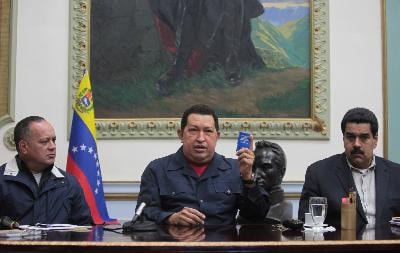Hugo Chavez has chosen a successor due to serious illness.
Venezuelan President Hugo Chavez on December 9 prepared to go to Cuba for surgery for his recurring cancer. This is the fourth time Mr. Chavez has had surgery since being diagnosed with cancer last year.
But this time, things seem more ominous, because Mr. Chavez has spoken for the first time about his idea of a successor, specifically choosing Vice President and Foreign Minister Nicolas Maduro as his number one candidate.
Chavez's announcement on the night of December 8, shortly after his return from Cuba following 10 days of treatment, shocked the people, in whose eyes he was a tireless leader who had been a constant presence in their daily lives.
"He will live! He will live! The commander will live!" a crowd chanted on Sunday in Bolivar Square in central Caracas. Supporter Vladimir Hernandez, 52, said he was heartbroken to hear that Chavez had to undergo further surgery. "I came here to ask God to help us in these difficult times," he said.
Supporters flooded Twitter with messages. The social network is hugely popular in Venezuela. Chavez himself has 3.7 million followers on Twitter. "My life was worth living until Chavez came along," one message read. Chavez is popular because he sees himself as a champion of the underclass and is despised by wealthy businessmen.
Chavez, 58, had declared himself cancer-free after being diagnosed and treated last year. But he was forced to admit the cancer had returned.
Appearing on television, Chavez said the treatment was absolutely necessary and admitted he might have to step down, adding that Maduro was his preferred successor. Chavez's move was seen by some analysts as the first step in a political transition.
The announcement of a possible successor underscored the seriousness of Chavez's condition, which he said was causing him pain and requiring painkillers. Chavez has made several trips to Cuba for treatment since his cancer diagnosis.
Over the past year and a half, Chavez has skipped almost every regional summit he usually attends, such as the Summit of the Americas in Colombia, the Mercosur Summit and last month's Hispanic Summit.
He returned last Friday after 10 days of treatment in Cuba. During his stay in Cuba, his medical team insisted on the possibility of surgery, which would have been his fourth since mid-2011. However, Chavez said he did not agree and returned home.

Mr. Hugo Chavez introduced his deputy, Nicolas Maduro (right), as the person responsible for leading the country while he was away for medical treatment (Source: AFP)
In what appeared to be a last will and testament, Chavez urged Venezuelans to vote for Maduro in the next presidential election if he could no longer hold power. "Choose Maduro as president of the republic. I ask you from the bottom of my heart," he said.
Maduro, who has served as Venezuela's foreign minister for the past six years, was appointed vice president after the presidential election in October. Since then, he has held both positions concurrently.
Chavez "initiated the transition of power" with his announcement on Saturday, according to analyst Luis Vicente Leon at the Datanlisis research institute.
He added that Maduro is "popular with voters and also has great political appeal, because he belongs to a more moderate force and he is also quite young."
The 49-year-old, a former bus driver, began his career in the union movement before joining Chavez's political forces.
In a move clearing the way for Chavez, Colombia's Congress on Sunday granted him the right to travel to Cuba and leave the country indefinitely, a further sign that his illness was getting worse.
The opposition has reacted to the secrecy surrounding Chavez's condition. "We have been hearing for months that the president was cured, only to have his illness return," said opposition lawmaker Julio Borges.

Mr. Hugo Chavez was re-elected President for a term lasting until 2019 (Source: AFP)
According to the Venezuelan Constitution, if a President is unable to assume power before his inauguration, scheduled for January 10, new leadership elections must be held within 30 days. The President of the National Assembly will serve as acting President until a new President is elected.
In the event of the President's death during the first four years of a six-year term, the Vice President takes over until a new election is held to choose a new leader for the country.
It is not yet clear what kind of cancer Mr. Chavez has, as he has kept the news secret. Chavez appeared weak and tired during the presidential campaign, but in the end still won another term, with the term lasting until 2019./.
According to (Vietnam+) - DT






